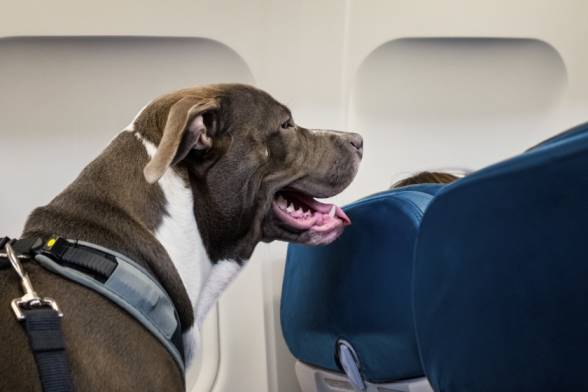Colleges and universities nowadays are not only catering to students aspiring to earn a degree. Higher educational institutions are also making room for the furry, scaly, and feathery companions of their students known as emotional support animals, or ESA. And while emotional support animals serve to ease the symptoms of mental and emotional disorders in students, it appears that there’s even more to love about having four-legged (or less) critters around. In light of these benefits, college campuses are taking on ways to accommodate ESAs.
What is an ESA?
An emotional support animal (ESA) is any animal that brings comfort to an individual with an emotional or psychological disability. It can be a pet that has been recommended by a licensed mental healthcare professional to comfort and alleviate symptoms of a disability in order for a person to go about their day-to-day activities.
We help people get the proper documentation to make their pet an official Emotional Support Animal. Online approval in minutes - Housing & Travel letters.
An ESA does not require special training but it does require a certification from a licensed mental health practitioner. Emotional support animals can be certified to reduce one or more symptoms of mental disorders such as anxiety, depression, ADHD, phobias, personality disorders and even post-traumatic disorder (PTSD). Dogs and cats are the most common emotional companions, but ESAs can also be other critters like fish, birds, and even some types of exotic animals.
Benefits of ESAs on Mental and Emotional Health
Studies highlight the benefits that pets have on their owner’s mental health. While anecdotal evidence points to improved mood and lower stress levels in pet owners, research regarding the impact of cats and dogs regarding mental health shows that merely stroking a cat or playing with a dog can have positive effects on our mental well-being.
There has been a notable increase in college students suffering from mental illness in recent years. Having emotional support animals to serve as companions or even serve as part of therapy for college students can help decrease its occurrence or its effect on students. With mental health being a major concern among college students these days, higher education institutions are finding it best to include emotional support animals in their campaign for mental wellness among their student populace.
Some also see the adoption of an ESA policy as an enhancement to the students’ education as having ESAs on campus can lead to more holistic learning and increased social responsibility in its student body.

Review symptoms, medications & behavior to keep your pets healthy with a Vet Online in just minutes.
We help people get the proper documentation to make their pet an official Emotional Support Animal. Online approval in minutes - Housing & Travel letters.
Legal Statutes for ESA
The Fair Housing Act and the Rehabilitation Act requires that US colleges and universities accommodate requests for students to room with an ESA. Under these laws, an ESA is entitled to live with its owner in campus residences without the student having to pay for monthly pet fees.
Though mandated by law, higher ed institutions have had to hurdle several challenges in order to adopt ESA policies that strike a balance between persons with mental disability, their roommates, and students that may not be keen to have such animals on campus.
ESA Policy and Challenges
Adopting a pet-friendly approach is not an easy feat—having ESAs on campus necessitates several changes in university housing regulations, administrative procedures, and campus living. However, the changes are ultimately worth the work.
Having an emotion support animal policy can not only address students’ request for such services, but it can also:
- Serve as a guideline regarding the use of an ESA. Not everyone is entitled to an ESA. A certification from a licensed mental health practitioner is required, and the college should have a review board to screen applications. With the proliferation of dubious websites offering ESA certification, colleges also need to ensure that the student has a history of consultations with the mental health professional and may also require an update regarding the progress of the student’s treatment.
- Outlines the procedure as to how students can obtain the service while studying in the college. There should be an office dedicated to the use and monitoring of emotional support animals on campus serves to address issues that may arise with ESA. This includes obtaining student information, pictures of registered ESAs, and monitoring sheets for possible grievance reports.
- Consider the type of accommodations suitable for the student and their emotional support animal. Most colleges need to modify their housing regulations to make room for ESAs. This can range from room accommodations to extended services, such as dog parks and vet services, that will be discussed in further detail below.
- Impose restrictions regarding places where an ESA is allowed. As opposed to service animals that must accompany students with disabilities to any location, emotional support animals can be restricted to certain locations on campus. The school needs to determine which of these areas can be considered an ‘ESA zone’ and delineate which areas these animals are prohibited.
- Define and restrict the type of animals qualified to be called as emotional support. Colleges may opt for a specific type of pet to be considered as an ESA. Some colleges accommodate a variety of animals—dog, cats, birds, snakes, etc.—but some may limit it to a certain animal, an age minimum for the ESA, or distinct breeds. Colleges and universities may also require ESAs to be sprayed or neutered, undergo full health screening, and receive a certification from the college’s biology department that the animal does not pose any danger to the health and safety of both other animals and students.
- Detail the responsibility of the student owner. Taking care of any animal requires immense responsibility that must be given due consideration given the rigors of college life. An ESA policy outlines the obligations of an ESA owner, such as: proper handling to ensure obedience and good behavior; provision for bedding, cages, food, and water supply; veterinary services; and other concerns.
- Adding a conflict resolution mechanism to address complaints that may arise regarding the use of a companion animal. Whether it be irate roommates, disgruntled students, or bewildered landlords, having a grievance system to address concerns that may arise because of the use of ESAs will prove beneficial in balancing the needs of all people on campus.
Implementing an ESA policy ensures that the school is supportive of students with mental and emotional disabilities. However, an ESA policy must not only consider accommodating the needs of its challenged students as it must also gain the support of the general student populace. Having a comprehensive ESA policy can also serve as an advocacy to eliminate biases against students and their animals while at the same time fostering empathy within the campus community.
Facilities for Emotional Support Animals
Once administrative policies are set up governing the use of ESAs, structures must also be provided to students with support animals. Depending on the capability of the college or university, these can range from basic room accommodation, pet dormitories, and animal care services.
- Room Accommodation
Allowing support animals to room in with their owners complies with the statutes set forth by the Fair Housing Act. However, most colleges confine ESAs to rooms only and the student’s roommate must also consent to the stay of the ESA in their lodging. The care and maintenance of the companion animal must also be the responsibility of its owner, and fines for damages to school property or non-compliance to house rules must also be put in place.
- Pet Dormitories
While there are students that may need animal companions to alleviate stress and lower anxiety, other students may not enjoy their company due to their own health conditions such as asthma or animal allergies.
A dedicated pet dormitory can serve as a convenient home for ESAs. This allows students to bond with their animals and fellow ESA owners without worrying about other students who might be negatively affected with the presence of an ESA in their residence halls. There are several colleges that devote entire residence halls to housing ESAs and may even extend these to service animals (guide dogs for the blind, etc.) and pets in general.
- Outdoor Parks and Alleys
Support animals are mostly confined to student rooms and dorms. However, being cooped up in rooms and crates for a long time may lead to aggressive and even destructive behavior in animals. In order to address this, some colleges opt to allocate parks and alleys so animals can have some time out for fresh air and have outlets to expend energy.
Having parks accessible for animals can also encourage some form of exercise for owners. Dog walking, for example, can provide necessary physical activity for students and their companions.
- Animal Care Services
Campuses must also be prepared to have veterinary services available as part of their ESA policy. Having a veterinarian onboard ensures the well-being of ESAs. In case the college does not have a vet available, they can assist student owners by recommending reputable veterinarians practicing nearby. Animal care services can also go beyond veterinary care to include dog day care, dog service and etc.
Student health services should also have a physician or station dedicated to any animal-bite or other similar injuries in the case of an emergency involving an ESA.
- Pet Graduations
While animal training isn’t a part of university curricula, ESA graduation or commencement programs serve to recognize the invaluable contribution of these animals to their owners as they battle the ordeals of college life. In one American college, there is a spring graduation or fall pet blessing where pets get to ‘graduate’ just like their owners. They have the opportunity to obtain a diploma and don a suit tailored for such a special occasion.
Some colleges also organize community events such as annual Halloween pet costume parades or pet awareness campaigns to strengthen the college’s advocacy for mental health awareness and social responsibility.
Other Animals on Campus
Having animals in college dorms and residence halls can have numerous advantages not only for their owners but it can impact other students as well. With regards to these, colleges and universities across the US are adopting policies that not only cater to emotional support but extend its doors to accommodate even service animals and pets in general.
- Service Animals – These are trained animals, most often dogs, that assist students with disabilities as they perform tasks. Service animals can serve as guides for visually impaired students, alert those with hearing impairments, or open doors for physically handicapped individuals. Service animals are required under the American with Disabilities Act (ADA) to accompany disabled persons in all premises.
- Pets – Colleges are increasingly allowing students without any disability to keep pets on campus. The reason behind this is that pets help students cope with the sudden separation from home and family and provide emotional and mental comfort through difficult periods and transitions. Pets have fewer restrictions on animal type and breed than ESAs or service animals. Some colleges allow birds, ducks, rabbits, hedgehogs, rats, snakes, and other kinds of pets.
- Pet Foster Programs – Having an ESA or a pet can come with expenses that some students may not be able to afford. Campuses can connect students to local shelters and have them act as temporary guardians while the animal is in the process of finding a permanent home. Colleges and universities may also offer scholarships for students who desire to act as foster parents to encourage students to not only care for animals but also to help them in their finances and nurture their sense of responsibility.
- Animal Therapy – Animals on campus can also serve as therapy for students. Interacting with pets can provide physical benefits like managing blood pressure levels, alleviating pain, and stimulating the release of endorphins. Animals therapy can also boost students’ self-esteem and help them improve their social interaction skills.
Summary
College life can be challenging as it requires adjusting to a new environment. The grueling grind of lectures, assignments, and deadlines can take a toll on a student’s mental and physical health. This is all the more amplified for people struggling with a mental or emotional disorder. Thanks to laws that recognize the benefit of having animals as stress relievers and guides, students can rely on their animal friends for support in anxious moments. Colleges and universities willing to accommodate ESAs can foster positive learning and adjustment for all students.

Tom
Tom has always loved to write since he was little - he wanted to be either a writer or a veterinary doctor, but he ended up being a professional writer while most of his works are based on animals. He was born in San Francisco but later moved to Texas to continue his job as a writer. He graduated from the University of San Francisco where he studied biotechnology. He is happily married and a soon to be father!
Review symptoms, medications & behavior to keep your pets healthy with a Vet Online in just minutes.
Ask a Vet Live Now



